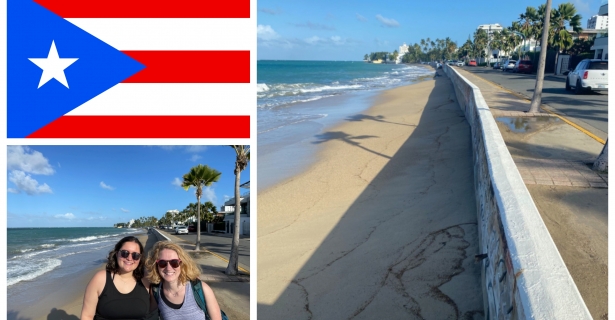Over winter break, we have been fortunate enough to travel to Puerto Rico through the IGL to conduct research on climate change resilience and sovereignty. After safely arriving on January 7th, we are excited to meet with an eclectic group of individuals who work in various aspects of Puerto Rico’s natural disaster relief efforts.
On January 8th, we conducted our first interview with Dra. Maritza Barreto-Orta, Director of the Coastal Research and Planning Institute of Puerto Rico at the University of Puerto Rico, Río Piedras. She has over 26 years of experience as a scientist working on coastal erosion and teaches graduate students about coastal planning. She serves on a number of advisory boards, such as her role as President of the Caribbean and Puerto Rico Beach Network and member of the American Shore and Beach Preservation Association and has done research with funding from NASA and FEMA.
She discussed how coastal erosion is not viewed as a pressing problem among Puerto Rican government officials and mainland government officials alike, while other issues related to climate change such as coral relief protection and biodiversity are seen as problems that need immediate attention. This leads to inadequate funding for projects that work on addressing the widespread issue of coastal erosion on the island – including the maintenance of natural/soft structures like beach nourishment that would mitigate its impacts. She stressed that while this is a long-term issue, short-term funding is needed to maintain coastal resiliency.
We discussed Ocean Park Beach, located in San Juan, and how it is highly affected by human infrastructure. In 2019, the area was particularly impacted by the destruction and rising sea level caused by Hurricanes Irma and Maria. The area has previously utilized hard structures to protect the beach and infrastructure, which counterintuitively cause more erosion that impacts local activities, ecosystems, and economies. Just two weeks ago, experts implemented natural methods as a mitigation strategy to protect the beach and reduce coastal erosion. She's working on promoting the continuous inclusion of natural coastal management strategies as they are more effective in combating erosion and resilience against severe weather events.
She spoke in-depth about the importance of making science, particularly around coastal erosion, accessible to local communities in order to convey the urgency of addressing this issue and for scientific information to be useful to individuals. Going forward, we will continue to examine the ways in which information about climate change in Puerto Rico is disseminated to government officials and the wider public.
After talking with Dra. Barreto-Orta, we visited Ocean Park Beach to see the urbanized coastline’s use of both hard and soft coastal erosion mitigation strategies.

